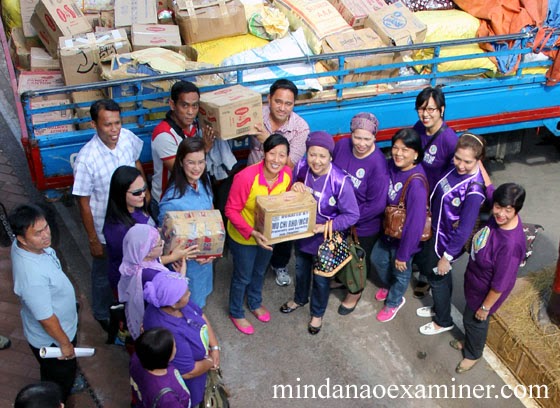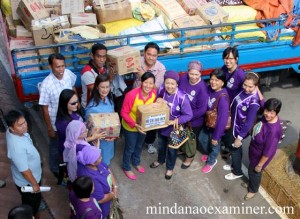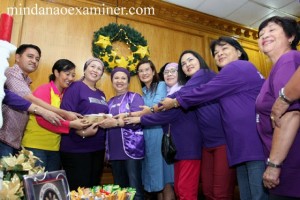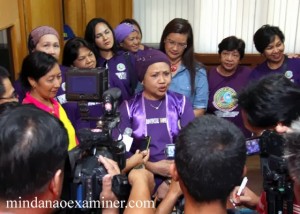
Philanthropist Hajja Nurunisah Tan, who heads the Sulu Provincial Women’s Council, led a small group to Zamboanga to personally deliver the relief aid donated by the provincial government and the people of Sulu.
“We are here again to show our support to the government of Zamboanga and to help the people displaced by the violence in September. This donation came from the people of Sulu, the various groups which shared out advocacy, and the provincial government in support to Zamboanga’s rehabilitation efforts,” Tan told reporters at the City Hall.
Tan, mother of Sulu Governor Totoh Tan, has vowed more aid for the refugees still encamped in tents in various evacuation sites here.
Salazar, accompanied by councilwoman Myra Abubakar and Jerry Perez, president of the Association of Barangay Council, thanked Tan and the provincial government and its people; and also the members of the Sulu Provincial Women’s Council for the donation at a time Zamboanga’s relief aid is almost depleted. “We are so thankful to the Sulu provincial government, the Sulu Provincial Women’s Council and all those who shared and donated their resources to help us here, especially at this time, and this will benefit our poor refugees,” she said.
The governors of Sulu; Jum Akbar of Basilan and Sadikul Sahali of Tawi-Tawi provinces, all under the Muslim autonomous region, have pledged to assist Zamboanga and its war refugees in an effort to hasten rehabilitation and rebuilding of the country’s third largest city attacked by Moro National Liberation Front separatist rebels in September.
Sulu province was among the first to respond to post-crisis emergency by donating over P3 million in cash and relief aid for the refugees.
Just this month, the three governors responded to the regional summit attended by over 200 leaders of various Muslims and Christian groups in Zamboanga City and pledged to support the rehabilitation efforts here. The conveners of the meeting dubbed “Confidence building, Reconstruction and Healing: What Muslim and Christian Leaders Can Do Together,” were the Darul Ifta, the City Government of Zamboanga and the Archdiocese of Zamboanga. The summit discussed the plight of the refugees who are still in various evacuation sites here.
Sulu Vice Governor Sakur Tan said Muslim villagers have sought the intervention of the governors and Muslim religious leaders to stop the relocation of the refugees and to allow them to return to their original villages. Tan said they are working in close coordination with the Sulu Provincial Women’s Council and different civil society groups, among others to send more aid for refugees, especially the women and children, in Zamboanga City.
“We are here to help our refugees and we shall continue helping them in coordination with the Zamboanga City government headed by Mayor Beng (Maria Isabelle) Climaco (Salazar), and of course the various groups which share our humanitarian advocacy,” the vice governor said.
The local government has relocated hundreds of refugees to far-flung villages where bunkhouses were built for them. But many refugees also protested the relocation, saying, it would be extremely difficult for them to rebuild their lives.
The villagers, many of them Tausug from Sulu ; Yakan, from Basilan; and indigenous Badjao tribe from Tawi-Tawi province – engaged in fishing and other traditional livelihoods – were being relocated to the far villages of Tulungatung and Taluksangay from their original habitat in the coastal villages of Rio Hondo and Mariki and other areas.
The Zamboanga government said it has built bunkhouses as temporary shelters to those affected by the violence, but it also warned that villagers who are not natives of Zamboanga would not be allowed to return to their former abode, unless they can provide certificates to show they are landowners.
Some of the displaced villagers accused the government of forcing them into relocating and others claimed social workers threatened to cut off relief aid should they reject the government offer to move to the hilly village of Tulungatung and Taluksangay.
While others protested, many also praised the government for providing them a living quarter and were elated by their new house, saying it greatly helped them in rebuilding their family and future. The bunkhouses, built by the army, were funded by the Department of Social Welfare and Development.
Those displaced by the fighting have been herded to a sports complex here, but the poor sanitation in the evacuation site makes it uninhabitable for many, and is also threatening the health of elderly, the women and the children.
Salazar urged the refugees to transfer to bunkhouses built by the government as they work for the completion of the rehabilitation plan. President Benigno Aquino has ordered the release of nearly P4 billion in funds to rebuild Zamboanga. (Mindanao Examiner)



